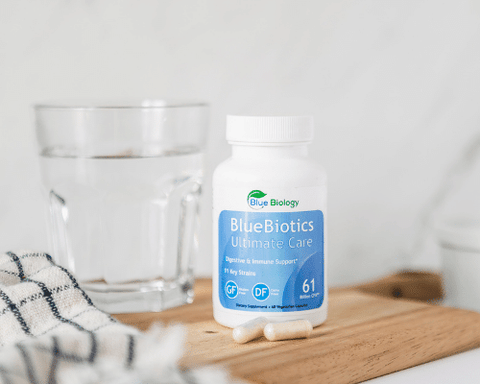8 Ways to Improve Nutrient Absorption
Share

Proper nutrient absorption is vital to your health. Getting inadequate nutrients or having poor nutrient absorption can lead to malabsorption syndrome, which can have serious consequences.
The side effects and complications of nutrient deficiencies depend on the type of nutrient deficiency. Some nutrient deficiencies can lead to stomach cramps/abdominal pain, diarrhea, or unhealthy weight loss. Other nutrient deficiencies can lead to poor memory, numbness of the hands or feet, and anemia.
Read on to learn about how to improve nutrient absorption and taking care of your health.
1) Eat a Healthy Diet
Getting nutrients from your diet is very important. It’s also the most natural way of obtaining the nutrients your body needs. According to the U.S. Department of Health & Human Services, a healthy eating plan emphasizes vegetables, fruits, whole grains, and fat-free or low-fat dairy products. It also includes lean meats, poultry, fish, beans, eggs, and nuts. (1)
2) Take a Multivitamin

Even if you eat a healthy diet, you may still end up not getting the amount of nutrients you should be getting. That especially goes for the aging population, as your body’s ability to absorb nutrients declines as you get older. (2)
By taking supplements, you can bridge the gap of the nutrients that you’re not getting enough of. (3)
3) Manage Your Stress

If you’re stressed out all the time, you might not be absorbing as many nutrients as you could otherwise. According to the American Psychological Association, stress can affect digestion, and what nutrients the intestines absorb. (5)
Not only that but stress can also affect other aspects of your gut health, such as making the intestinal barrier weaker, leaving you more vulnerable to infection.
4) Eat a Healthy Variety of Foods
In order to get the nutrients your body needs, it’s important to consume a variety of foods from each of the different food groups. Nutritional deficiencies have been observed in people who eat a very limited variety of food. (6)
5) Get More Vitamin C and Iron
Pair certain foods and supplements. Some nutrients promote better absorption of other nutrients.
For example, vitamin C-rich foods, such as oranges, increase absorption of the iron found in iron-rich foods, such as red meat or legumes.
Some other food/supplement combinations that pair well together include:
- Turmeric and black pepper
- Black pepper increases turmeric absorption
- Calcium and vitamin D
- Vitamin D increases the absorption of calcium, which is good for the health of the bones
- Fat and fat-soluble vitamins
- Certain vitamins are better absorbed by the intestines when paired with healthy fats, namely vitamin A, vitamin D, vitamin E, and vitamin K. Unsaturated fats can be found in avocados, nuts, seeds, olives, and olive oil.
6) Limit Your Alcohol and Caffeine Consumption
Some studies suggest that caffeine can interfere with the absorption of certain nutrients, such as B vitamins, calcium, iron, and magnesium.
Alcohol impairs nutrient absorption as well. Alcohol does this by damaging the lining of the stomach and intestines, disabling the transport of nutrients to the bloodstream and by decreasing the secretion of digestive enzymes. (7)
7) Chew Thoroughly When Eating Meals
Chewing thoroughly is an important part of the digestive process. Chewing thoroughly releases more digestive enzymes, such as amylase and lingual lipase, which help to break down food. If you don't chew very thoroughly, you may be leaving the breakdown of food up to just your stomach acid, which may not break it down enough.
One study found that participants who chewed almonds 40 times had better absorption of healthy fats than participants who just chewed 10 times. (8)
8) Take a Probiotic Supplement
Your gut is home to approximately 100 trillion bacteria within their digestive system. The condition of these bacteria (collectively known as the gut microbiome) play a huge role in regulating gut health and nutrient absorption from food. Taking a high-quality probiotic supplement, like BlueBiotics: Ultimate Care floods your gut with beneficial types of bacteria to flush out the bad bacteria that cause poor nutrient absorption and inflammation within the system.
Conclusion
Proper nutrient absorption is vital to your health, so it’s important to a) get enough nutrients in the first place and b) do what you can so that your body absorbs the most nutrients possible.
Improving your nutrient absorption starts with eating a healthy diet. From there, if you’re still not getting enough nutrients, you can take a multivitamin to bridge some of the gap. Additionally, you can do things like take probiotics, manage your stress, pair nutrients like iron and vitamin C and calcium and vitamin D, limit your alcohol/caffeine consumption, chew your meals thoroughly, and take a high-quality probiotic supplement.
These are just some of the ways you can improve your nutrient absorption. If you suspect you’re not getting enough nutrients, be sure to consult with your doctor to diagnose the problem and come up with a plan of action for the best way of addressing it.
Sources
- https://www.nhlbi.nih.gov/health/educational/lose_wt/eat/calories.htm
- https://www.ncbi.nlm.nih.gov/pubmed/11977925
- https://academic.oup.com/jn/article/141/10/1847/4630521
- https://www.ncbi.nlm.nih.gov/pmc/articles/PMC3601187/
- https://www.apa.org/helpcenter/stress/effects-gastrointestinal
- http://agris.fao.org/agris-search/search.do?recordID=US8629437
- https://pubs.niaaa.nih.gov/publications/aa22.htm
- https://academic.oup.com/ajcn/article/89/3/794/4596705

